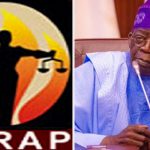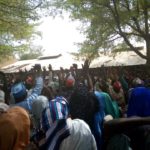The Senate on Wednesday resolved to investigate the reported withdrawal of soldiers from Government Girls Secondary School, Maga, in Kebbi State, barely thirty minutes before gunmen invaded the school around 4:30 a.m. and abducted 25 schoolgirls.
It also urged the Federal Government to review Nigeria’s firearm laws to permit responsible citizens to own guns, while adopting a resolution categorising kidnapping as terrorism and calling for amendments to the Terrorism Act to include the death penalty for offenders.
Another inquiry was approved into the killing of Brigadier-General Musa Uba by ISWAP fighters in Borno State, with lawmakers seeking clarity on allegations that his location may have been compromised by his own team.
These decisions followed a charged session dominated by concerns over escalating insecurity in Kwara, Kebbi, and Niger states, with senators warning that Nigeria is “at war” and accusing security agencies of “unexplainable failures” that continue to endanger lives and undermine national stability.
The debate intensified after lawmakers expressed outrage over reports of troops being withdrawn from a primary school in Kwara State where children had been taking refuge, shortly before bandits struck the area and abducted residents.
The controversy was highlighted when Senator Enyinnaya Abaribe drew attention to what he termed a suspicious military withdrawal from Government Girls Secondary School, Maga, in Danko-Wasagu Local Government Area of Kebbi State, shortly before the attackers arrived. Senators demanded to know who authorised the order, warning of possible negligence or complicity.
“The world wants to know. Nigerians want to know. We who are directly affected want to know,” one senator remarked. “If we don’t get to the bottom of this, this incident will keep repeating.”
Senate President Godswill Akpabio added: “It is still a national secret who commanded that those men be withdrawn. Nigerians should know the name, and the person must be brought to justice under the Terrorism Act.”
The debate stemmed from a motion of urgent national importance moved by Deputy Senate Leader Lola Ashiru (APC, Kwara South), titled, ‘Urgent need to address escalating insecurity in Kwara, Kebbi and Niger states.’
The motion detailed a series of recent attacks, including the November 18 attack on Christ Apostolic Church (CAC) in Eruku, Ekiti Local Government Area of Kwara State, where two worshippers were killed and 38 abducted. Gunmen reportedly returned to the same community days later, kidnapping 11 more residents, including a pregnant woman.
The senator revealed that residents had been trained in escape and survival strategies, yet protection was withdrawn when they needed it most.
Several lawmakers warned that the frequency and coordination of attacks suggest a war-like situation. “Nigeria is at war,” a senator from the North-West said. “These terrorists—Boko Haram, ISWAP, bandits—are not Nigerians. They are coming into this country to disrupt our peace. This is external aggression.”
Another senator claimed intelligence reports point to a broader international conspiracy aimed at provoking foreign military intervention.
Senate President Akpabio linked the rise in attacks to a controversial social media post by U.S. President Donald Trump, in which he suggested possible U.S. involvement in Nigeria over alleged religious persecution. Lawmakers argued that extremists may be trying to create enough chaos to justify foreign intervention.
“This renewed trend is political,” one senator said. “They want to cause as much insecurity as possible to encourage America to come in. They want power by destabilising our democracy.”
Lawmakers insisted the violence is not religiously motivated. “There is nothing like Muslims being targeted or Christians being targeted. A bullet does not know who is who,” a senator said. “There is only one side in this matter — the protection of Nigerians.”
While expressing frustration, senators commended President Bola Ahmed Tinubu for efforts to secure the release of kidnapped schoolchildren and for continuous engagement with security chiefs to address the crisis.
“One child rescued is a relief for the whole country. Fifty-eight children rescued is commendable,” a senator said.
Another lawmaker stressed that the president has consistently sought Senate approval for supplementary budgets to boost armed forces’ capacity. “Those funds were not approved for the adversaries to buy ice cream,” he said. “They were meant to equip our forces.”
However, senators warned that the president’s efforts would fail unless the military launched sustained offensives against terrorists. “We know the bandits. We know where they are. We know the routes they use. Everybody knows. So why can’t we muster the strength to simultaneously attack all their hideouts and eliminate them?”
Senator Adams Oshiomhole criticised what he described as inconsistent and lenient judicial decisions in terrorism cases. “When the law says terrorism attracts the death penalty, no judge has the right to sentence 20 years. It is not sentiment. It is the law,” he said.
Lawmakers also raised concerns about the closure of schools in volatile regions. “What message are we sending to the world when bandits force a government to shut down educational institutions?” a senator asked. “The future of our children is under attack.”
The Senate proposed withdrawing police officers currently assigned to VIPs, replacing them with civil defence personnel, and redeploying police officers to vulnerable communities.
“Police must return to their constitutional duty,” Akpabio said. “We cannot allow bandits to overrun our communities.”
Senator Seriake Dickson emphasised collective responsibility. “We must not trivialise this matter. It is the collective responsibility of every Nigerian to make this country work.”
At the end of the session, the Senate resolved to probe the withdrawal of soldiers from the Kebbi school, demand accountability from the officer who authorised it, and strengthen military operations in Kwara, Niger, and Kebbi states.
Lawmakers reaffirmed support for President Tinubu’s rescue efforts and called for improved intelligence-sharing, stronger community security structures, and strict enforcement of terrorism laws.
Closing the debate, the Senate President stressed that the government must demonstrate decisive leadership, and citizens must stand behind the military. “We must not choose fear or despair,” he said. “Nigeria cannot bow. We will overcome this coordinated attack on our democracy.”










